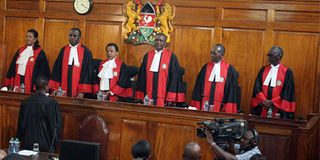Supreme Court jobs expose vested interests

Supreme Court judges ready to deliver their judgment on the presidential election petition on September 1, 2017. PHOTO | FILE | NATION MEDIA GROUP
What you need to know:
- The Supreme Court retains exclusive jurisdiction to hear and determine presidential election petitions, making it a perennial target for politicians and other influential individuals.
- Should Justice Ibrahim opt to retire, there will be three positions in the Supreme Court that will need to be filled in the coming years, but before 2022.
Shortly after the Supreme Court nullified the August 8 presidential election outcome, President Uhuru Kenyatta and the Jubilee brigade came out guns blazing.
In a series of public statements from the afternoon of September 1, when the apex court announced the decision that led to a repeat election, Mr Kenyatta variously promised to “revisit” and “fix” the Judiciary.
While some have viewed subsequent personal attacks against judges and initial severe budget cuts in the Judiciary that were later adjusted upwards on Friday as part of the Executive’s retaliation, a bigger battle to influence the composition of the Supreme Court is going on in the background ahead of the 2022 elections.
Depending on the decision of an impending case against Deputy Chief Justice Philomena Mwilu, up to four vacancies — a majority for a seven-judge court — could fall vacant ahead of 2022.
POLL PETITION
Only Justices Smokin Wanjala, Njoki Ndung’u and Isaac Lenaola could be left standing by 2022, with Justice Mwilu’s fate depending on her fight against prosecution.
The Supreme Court retains exclusive jurisdiction to hear and determine presidential election petitions, making it a perennial target for politicians and other influential individuals.
Justice Mwilu has already accused the Director of Public Prosecutions Noordin Haji and the Director of Criminal Investigations George Kinoti of going for her to force her out and create a chance to reconstitute the Supreme Court.
“The 1st and 2nd respondents (Mr Haji and Mr Kinoti respectively) are seeking to intimidate and oppress the petitioner (Justice Mwilu) into relinquishing her position and office as the Deputy Chief Justice by brandishing the sword of punishment under the criminal law, rather than in any genuine desire to punish on behalf of the public any alleged crime. They therefore must be stopped,” the embattled Deputy CJ stated in her petition to the High Court to stop her prosecution.
RETIREMENT
In the expected re-organisation at the Supreme Court, at least two judges — Chief Justice David Maraga and Justice Jackton Ojwang’ — are expected to leave before 2022 having attained the mandatory retirement age of 70.
CJ Maraga, born in 1951, will be 70 years sometime in 2021, just a year to the General Election.
He has often refused to be drawn into any discussion that he could follow in the footsteps of his predecessor Dr Willy Mutunga and retire earlier.
“It is too early to discuss my retirement, really. I still have quite a bit of work to do, and there is time to do it. But when we come near the time, I will take a decision which I think will be in the best interest of the country,” he told the Sunday Nation in an interview earlier this year.
Justice Ojwang’ on the other hand will be retiring in 2020 having been born in 1950.
IBRAHIM
Meanwhile, there has been speculation that Justice Mohamed Ibrahim could also be leaving, mainly due to health concerns that have been well-publicised.
In August last year, he left the bench that was hearing the successful Nasa petition that overturned the August 8 presidential election outcome.
Should Justice Ibrahim opt to retire, there will be three positions in the Supreme Court that will need to be filled in the coming years, but before 2022.
Separately, the arraignment of Ms Mwilu over corruption charges and the publicity that has received has raised questions. In the absence of her present woes, Justice Mwilu would be the natural heir to Mr Maraga.
Besides, as DCJ, she is expected to act as Chief Justice for the duration the Judicial Service Commission (JSC) would be carrying out the recruitment that could take months to conclude.
APPEALS
Ahead of the much awaited inter parties hearing on her petition, a commissioner with the JSC, Prof Tom Ojienda, told the Sunday Nation that the DCJ will continue discharging her duties normally, including being part of the bench that will be hearing election petition appeals.
Homa Bay Governor Cyprian Awiti’s appeal against the decision to overturn his 2017 election will be among the first the Supreme Court will be hearing from Monday.
According to Prof Ojienda, so far there are only allegations which might require the interpretation of the constitution on how to proceed with them.





